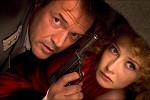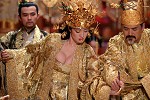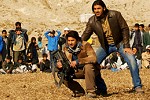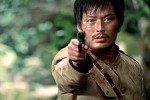 Arthouse films ’06
Arthouse films ’06KABUL EXPRESS | WELCOME TO DONGMAKGOL
< < M O R E | M O R E > >
last update 13.Dec.06
See also: SHADOWS FILM FESTIVAL | SHORT FILMS
 R E V I E W B Y R I C H C L I N E
R E V I E W B Y R I C H C L I N E Zwartboek
Zwartboek
 After 20 years in Hollywood, Verhoeven returns to his homeland to make a sprawling, complex, entertaining wartime thriller, harking back to themes he's explored from Soldier of Orange to Basic Instinct--relational turmoil, violent mystery, naked women.
After 20 years in Hollywood, Verhoeven returns to his homeland to make a sprawling, complex, entertaining wartime thriller, harking back to themes he's explored from Soldier of Orange to Basic Instinct--relational turmoil, violent mystery, naked women.
Rachel (van Houten) is a gifted singer forced into hiding by her Jewish heritage. When her hideout is accidentally bombed, she goes on the run, witnessing horrific atrocities and joining with resistance fighters led by a businessman (de Lint) and a doctor (Hoffman). During a dangerous mission, several group members are captured, and Rachel volunteers to infiltrate the Nazi command, even if it means sleeping with the SS commander (Koch). But once inside, Rachel discovers it's not quite as black and white as she expected. And when the war ends, it gets even worse.
Verhoeven keeps things moving briskly from the beginning, smoothly shifting between action set-pieces and intense drama. We've got to pay attention to remember who's who (the uniforms help), who's really good or bad, and what they're up to. But these are recognisably human figures--flawed and fascinating. And even the most brutal villains (Kobus' ruthless Nazi and Blok's smiling traitor) have moments in which they're strangely likeable.
Van Houten holds the film together with a gripping performance that reveals energy, tenacity, fragility and pain as Rachel goes through a series of astonishing experiences, each of which is based on real events (although the character is fictitious). She even manages to maintain her dignity as Verhoeven continually removes her clothing, often for somewhat feeble reasons. And the same goes for the terrific Reijn as her lively friend and coworker.
Despite these prurient lapses, this is an extremely strong film, combining an astonishing story with an important message about how we prefer history (and life in general) simple and easy to understand, while reality is often much more demanding. One Nazi actually emerges as the hero of the story, which is something most filmmakers would never dare do. That Verhoeven can make this point so forcefully while keeping us so thoroughly engaged is no mean feat.
scr Gerard Soeteman, Paul Verhoeven
with Carice van Houten, Sebastian Koch, Thom Hoffman, Waldemar Kobus, Halina Reijn, Derek de Lint, Christian Berkel, Dolf de Vries, Peter Blok, Michiel Huisman, Johnny de Mol, Ronald Armbrust
 release Ned 14.Sep.06, UK 19.Jan.07, US 2.Mar.07
release Ned 14.Sep.06, UK 19.Jan.07, US 2.Mar.0706/Netherlands 2h25
VENICE FILM FEST
TORONTO FILM FEST
LONDON FILM FEST
6.Dec.06
 R E V I E W B Y R I C H C L I N E
R E V I E W B Y R I C H C L I N E
 One of the biggest films ever made in China, this visually magnificent and emotionally resonant film is based on true events, recreated with style and passion on screen.
One of the biggest films ever made in China, this visually magnificent and emotionally resonant film is based on true events, recreated with style and passion on screen.
In the year 928, the Chinese Empress (Gong) realises her husband (Chow) is poisoning her. So she sets in motion a plan to guarantee a legacy for her two sons, the Emperor's favourite Jai (Chou) and the arrogant youngster Yu (Qin). But the soulful Crown Prince Wan (Liu) is the son of a now-dead, venerated first wife. Or so everyone's always been told. And there are a few more wrinkles, mainly because Wan has been sleeping with all the wrong women. And the Emperor isn't oblivious to all of this, so a massive showdown is on the horizon.
Director-cowriter Zhang assembles this story with an astounding visual style; scene after scene takes our breath away with lush colours, rich textures and a massive sense of scale. This royal family lives in the apex of opulence, and the film catches this in ways that are both microscopic and enormous. From the golden terraces of chrysanthemums to the armies of clashing soldiers, it's quite literally spectacular.
And the story is powerful as well, with a pointed examination of a family ripping itself apart in the most horrific way. Gong has the most impressive scene-chewing role, as her poison drives her insane, not that she needs any help. She layers the character with all kinds of internal aches and pains. And everyone around her is similarly conflicted. Chou is the standout, as a smart young man forced into a terrible corner. And Chow is so cool that we continually underestimate the Emperor's ruthless grip on power.
These characters have enough conflicting relational issues to fill about a year on a daily soap; it's messy and passionate, murderous and lusty. And we know the conclusion can't be easy. Yes, Zhang goes a bit over the top, and some of the power-corrupts moralising is a little heavy-handed. But we're not quite prepared for what does happen, namely a wrenching confrontation that makes the battles in Lord of the Rings look like child's play. Both gorgeous and harrowing.
scr Zhang Yimou, Wu Nan, Bian Zhihong
with Gong Li, Chow Yun-Fat, Jay Chou, Liu Ye, Qin Junjie, Chen Jin, Li Man, Ni Dahong

release Chn/US 21.Dec.06, UK 13.Apr.07
06/China Sony 1h54
A CONVERSATION WITH GONG LI
11.Dec.06
 R E V I E W B Y R I C H C L I N E
R E V I E W B Y R I C H C L I N E
 Lively and colourful, this film tries to mix Bollywood-style slapstick with serious violence in its Afghan setting. This might work for genre fans, but for Western filmgoers it's extremely uneven.
Lively and colourful, this film tries to mix Bollywood-style slapstick with serious violence in its Afghan setting. This might work for genre fans, but for Western filmgoers it's extremely uneven.
Suhel and Jai (Abraham and Warsi) are Indian journalists who travel into Afghanistan in November 2001, just after the American bombing campaign has reduced the country to rubble. Their goal is to interview a member of the now-hiding Taliban. Their guide and driver is the fiercely nationalistic Khyber (Ghum), and along the way they encounter an American journalist (Arsenio)and a Talib (Shahid), who kidnaps them and forces them to drive to the Pakistan border so he can return home. Adventures ensue.
Writer-director Khan opens the film like a documentary, with footage of the 9/11 attacks, establishing a sober undertone that jars against the wacky action. As Suhel and Jai roam around the desert like a cut-rate Hope and Crosby, they encounter goofy locals, see haunting locations and survive terrifying shootouts. The blend of serious and silly (including a musical number) never works. How do you punctuate a road comedy with grisly things like two men being brutally killed by an angry mob?
That said, the microcosm inside Kyber's car is intriguing--a Pakistani terrorist, an Afghan, two Indians and an American. Their interaction is often corny (such as when they argue about cricket players or whether Coke or Pepsi is better), but the tension is palpable, as is the surprise in each character when they discover the ability to see beyond the barriers to the human underneath.
And the acting style is painfully stiff. While Warsi has decent comic timing, Abraham is just a pretty face. And Arsenio is forced to utter some truly terrible dialog. Unsurprisingly for an Indian film, Pakistan is the true villain of the piece, although at least Khan tries to explain the complexities of both history and the current situation. And there are several telling encounters along the way.
It's also especially well filmed, with the expansive landscapes, vivid desert terrain, snow-capped mountain ranges and bombed-out buildings. The lively tone makes it watchable, and seeing this situation from such a profoundly non-Western perspective can only help us understand it better.
with John Abraham, Arshad Warsi, Linda Arsenio, Hanif Hum Ghum, Salman Shahid, Rasool Eman, Baraki
 release UK 15.Dec.06
release UK 15.Dec.0606/India Yash Raj 1h46
TORONTO FILM FEST
8.Dec.06
 R E V I E W B Y R I C H C L I N E
R E V I E W B Y R I C H C L I N E
 Lively and energetic, this offbeat war epic makes some strong points about the nature and results of war. And it maintains an intriguingly comical tone. But it can't sustain the concept over two and a quarter hours.
Lively and energetic, this offbeat war epic makes some strong points about the nature and results of war. And it maintains an intriguingly comical tone. But it can't sustain the concept over two and a quarter hours.
Dongmakgol is a tiny village in the mountains between north and south Korea, and in 1950 they're completely oblivious to the war around them. When an American pilot (Taschler) crashes nearby they take him in. And they also take in a trio of lost North Korean soldiers (Jeong, Im and Ryu). Then a pair of southerners (Shin and Seo) stumble in, and now there's a Mexican standoff in the village square. It results in the destruction of the winter food storage, so these lost soldiers are forced to work together to replenish the supplies.
There are all kinds of intriguing things going on in this film, from the Shangri-La references to tiny cultural quirks as these characters bounce off each other, taunting and threatening and eventually finding a tentative brotherhood. None of this happens simplistically, and there are some incredibly dark moments amid the general breeziness. The film's obvious message is extremely strong, examining the artificial barriers we build between us.
It's also extremely well-filmed, with impressive effects sequences and a real sense of the setting's natural beauty. Director-cowriter Park indulges in a few wacky set pieces, from the hilariously extended standoff to a ridiculous wild boar attack. Some of these scenes are pointed and sharp, while others feel like comical padding. But as the Americans wade in to upset the fragile balance of peace, the point is made that youth and innocence are the real losers in any war.
This combination of sweet cuteness and serious violence is sometimes awkward. A few cast members struggle to convey both of these moods, while the cruel brutality that continually invades the film never quite gels with the otherwise droll attitude. In the end, it's surprisingly engaging, and worth seeing for its extremely original perspective on a brief and pivotal war. And also on the concept of war in general.
scr Joong Kim, Kwang-Hyun Park
with Jae-young Jeong, Ha-gyun Shin, Ha-ryong Im, Steve Taschler, Jae-gyung Seo, Duk-hwan Ryu, Hae-jeong Gang, Jae-jin Jung, David Joseph Anselmo, Young-yi Lee, Jon Emm, Leif Gantvoort

release Kor 4.Aug.05,
UK 2.Feb.07
05/Korea 2h13
27.Nov.06


See also: SHADOWS FILM FESTIVAL | SHORT FILMS
© 2006 by Rich Cline, Shadows
on the Wall